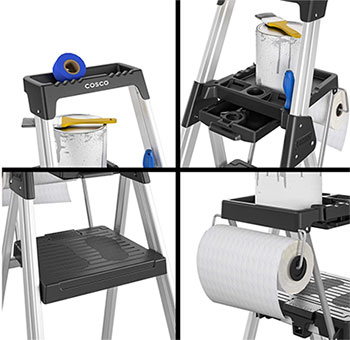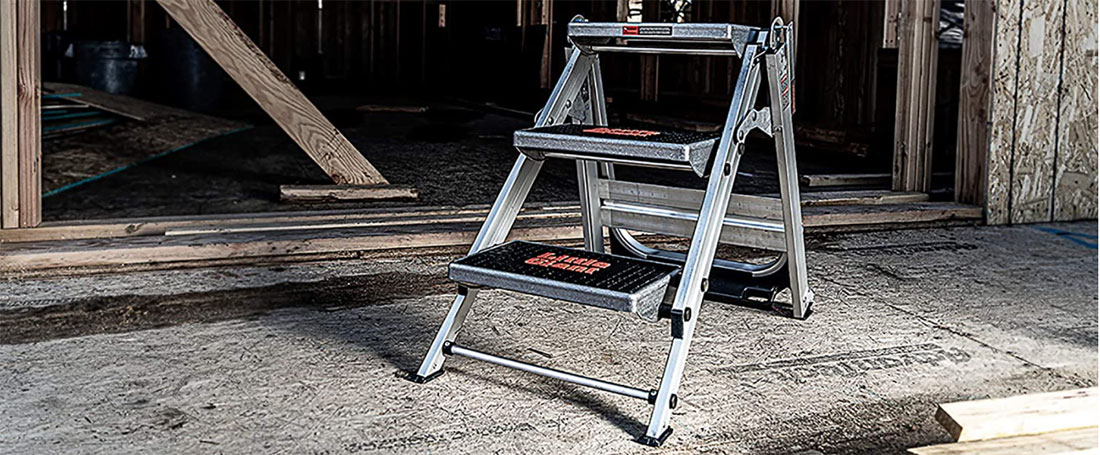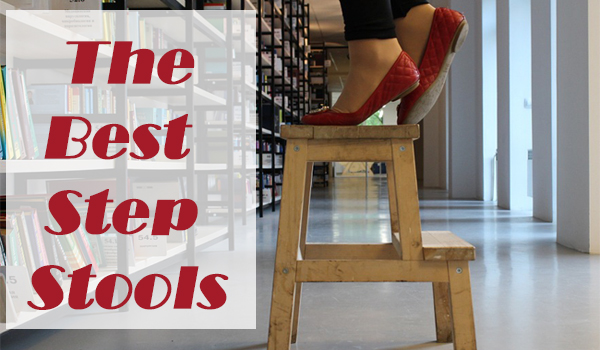Best Step Ladders for Elderly – Grab Your Perfect Product
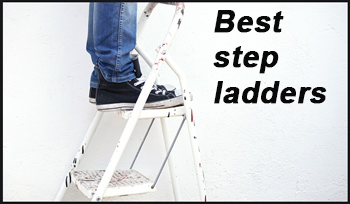 According to statistics, about 175,000 Americans visit the emergency room every year with all sorts of falling injuries, back injuries, and other complications. You will be improving your home one day, and you end up with an injury that will stall your next day’s activities. However, our beloved seniors may suffer even worse from such accidents. So read on to find the best step ladder.
According to statistics, about 175,000 Americans visit the emergency room every year with all sorts of falling injuries, back injuries, and other complications. You will be improving your home one day, and you end up with an injury that will stall your next day’s activities. However, our beloved seniors may suffer even worse from such accidents. So read on to find the best step ladder.
While most of the slips and falls might be caused by human negligence and errors, it is important to ensure that you and your family members have the best step ladders for the elderly and successful job.
The materials and the features of the step ladder should succinctly meet your needs. Safety measures are also crucial, as well as many other characteristics. Below is a simple guide to help you choose the right ladder for different projects regardless of the person’s age and abilities.
Comparison Table
1. Flip-N-Lite 300-Pound Step Ladder – Best Step Ladders Overall
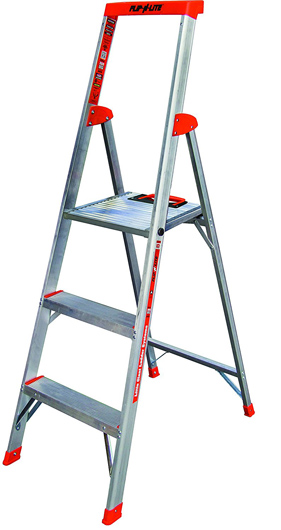
- Engineered strong for safety
- Rust-resistant and smooth for easy maintenance
- Folds and unfolds easily with one hand
- Relatively pricey
The Flip-N-Lite 300-Pound Step Ladder was designed to offer safety to the user while still saving them money. It is a lightweight 5-footer ladder that accommodates 300 pounds. This ladder opens with great ease, and you can open it with one hand. It is comfortable with deep steps and a secure standing platform.
It boasts of a slim profile but with extra duty aluminum construction, enhancing its durability and making it safe. If you have been doing simple construction and home improvement projects, this ladder will offer you the best climb-in comfort.
We highly recommend the product to those who need a comfortable and safe step ladder. This is the main reason why we entered this model to the best step ladders for seniors review.
2. Little Giant Model 17 250-Pound Step Ladder – Best Aluminum Step Ladder
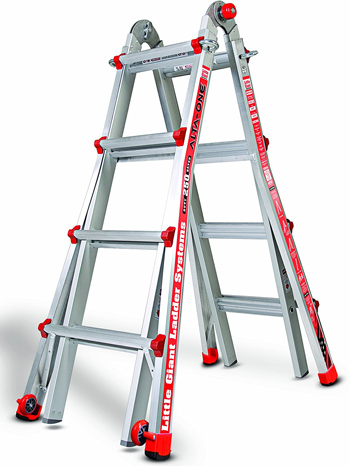
- Tall for different projects
- Made of high-grade aluminum for durability and stability
- Lightweight for easy movement
- Relatively high price
This unit is rust and slip resistant, making it safe for use in different positions. It is created for extra heavy-duty performance, accommodating up to 300 pounds. It has eight steps, allowing you to reach high up the roof. It folds easily for storage. At only 29 pounds, this ladder is light enough to move from one place to the next.
3. Best Choice Products 3-Step Ladder – Best Steel Frame Step Ladder
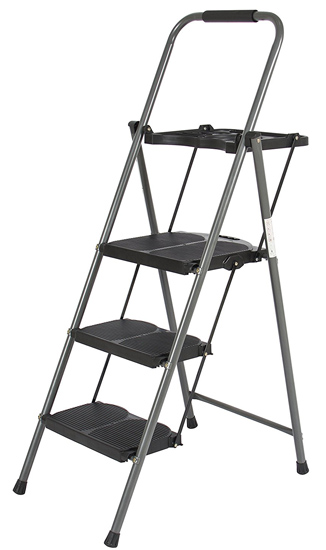
- Simple tray to hold tools during work
- Textured steps, making it non-slip
- Folding is relatively challenging
The ladder accommodates up to 330 pounds, but it is still light enough at 15.5 pounds. Users note especially easy folding and unfolding, which contributes to storage. The item is made in grey and black colors with a smooth surface for easy maintenance.
4. Cosco 20-502ABL 5-Foot Aluminum Step Ladder – Best 5-Foot Ladder
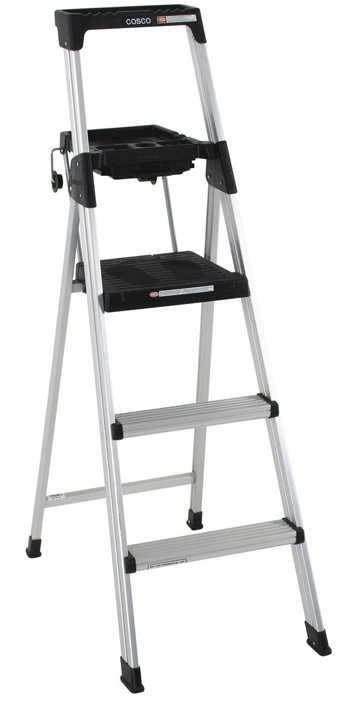
- Fitted with large trays to keep tools and construction parts
- Offered with a generous 5-year warranty
- Comfortable hand grips
- Holds only 225 pounds
Besides folding with ease, the ladder is fitted with a carrying handle that has a security lock. Each ladder has large working trays with a deep top cap, recessed areas for tools and paint cans, and a drawer to keep small parts. This is a medium-duty ladder rated 225 pounds. You are offered a 10-year warranty, showing its strong build.
5. Little Giant Three-Step Aluminum Ladder – Best Step Ladder for Home Use
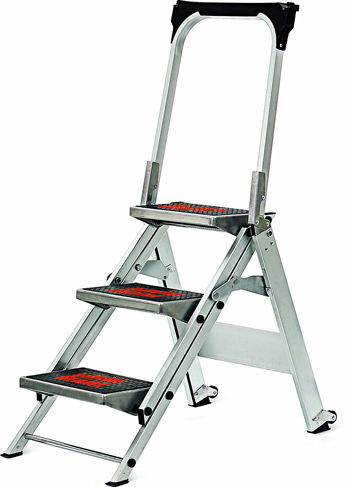
- Easy to close and easy to open
- Heavy-duty construction for sturdiness
- Fitted with wheels for easy transport
- Relatively short
The ladder is tough and compact. It boasts a handy tool tray to hold all your tools and parts during a project. And excellent tip and glide wheels let you move it from place to place with less fatigue. The solid construction means that every person can use it.
Buyers Guide
Ladders are very important, especially if you are always doing home improvement projects. You may also want to change a bulb or access something in the attic. Select a good ladder to ensure you are safe on it. Below is a guide to help you out.
Choosing a Ladder Style
There are numerous styles of ladders to choose from, and as such, you need to first choose a ladder style and size that fits your needs and specifications. There is a ladder for every purpose. You need to have one that can both help get the job done and keep you safe and stable while on it.
If you choose the wrong ladder or neglect the capabilities of the ladder you choose, it will increase the chances of you slipping and having an injury.
Extension ladders are the most widespread options, thanks to their simplicity and great price. Other types include three-step and four-step ladders. To choose the best type of ladder, you need to consider the purpose of the ladder.
Choosing a Ladder Height
You will need to choose a ladder that meets your requirements and your specifications. An appropriate height ensures effectiveness while enhancing safety. If most of your projects involve the ceiling, ensure that you choose a tall ladder.
Most step ladders have three or four steps, but others, the taller models, have up to 8 steps, letting you reach the ceiling and other high places.
Duty Rating of a Step Ladder
Ladders are engineered to hold a specific level of weight based on the material of construction. Most of the ladders are designed with different weight settings and duty ratings. You can determine the weight rating by looking at the type and the grade of a ladder. The rating of a ladder shows the highest level of weight that a ladder carries.
The weight rating of the ladder accounts for the person, the tools they are carrying on the tray, and the clothes they are wearing. If there are other items hanged on the ladder, their weight should also be considered. The total weight of all items held on the ladder should not exceed the duty rating of a ladder to ensure safety. Ladders are engineered to handle a variety of applications and all demands that come with those applications.
For instance, a ladder that is used in a job site is designed for rugged construction pros. Such a ladder should be made of commercial or industry-grade materials to last long. The ladder should also have a high duty rating seeing that it is frequently used. Ladders used at home for simple tasks such as bulb fixing and the attic accessing can have a low duty rating and lighter materials.
Choosing Ladder Material
When buying a step ladder, you need to consider its material. The material of a ladder determines its durability and sturdiness.
- Aluminum ladders are strong and durable and lighter than other materials used for step ladders. Steel and stainless steel are strong and rust-resistant, but they are relatively heavy. Both aluminum and steel are rust-resistant and durable.
- Wood is a classic material. It is strong and has a high duty rating, but it is heavy and not easy to move around. Wooden ladders are not suitable in a construction job site as they wear out with ease.Each of these materials serves a given purpose, but when you are choosing, it is a matter of personal preference. However, some materials are not suitable for specific job sites. You cannot buy an aluminum step ladder if you are working near a power line. The material should be selected based on the working environment.
- Fiberglass and plastic are other materials common with ladders. Fiberglass is stronger than plastic, but both are light-duty materials that should not be used on a construction job site. If you need a ladder for light tasks at home, any material, including plastic, is good for you.
Safety Features
- The Legs – A good ladder should be safe and feel safe to the user. The legs of the ladder need to be large and well-positioned on the ground. When the legs are large, they take up more space on the ground, making them stable. The legs should be fitted with a skid resistant material such as rubber to ensure that they do not move when you are on the ladder. The skid resistant material also protects your floor from damage.
- The angle at which the step ladder opens will also determine its stability. Ladders that open up to 90 degrees are highly stable and can even withstand shaking. If a ladder opens less than 90 degrees, it might be a little wobbly. After unfolding the ladder, there should be an effective lock mechanism to keep it open during operation.
- The Steps – The steps of a step ladder should be slip resistant. Some of the ladders have metallic steps, which are textured to make them slip resistant. The size of the steps also enhances their safety. A good-sized step and a safe one should fit at least 3/4 of the length of your feet. This lets you stand stable on the ladder.
- Some steps are rubberized to make them slip resistant. With rubber, you have a good grip at all times, whether you are standing or you are walking up the steps. Ensure that the steps are firmly fixed on the side rails to ensure their safety.
- Some of the ladders on the market are fitted with a rubberized grip on their side rails, making it easy for you to climb the stairs. The ladder should feel safe at all times.
Height – The height of the ladder relative to its base determines its safety. A tall ladder, eight or more steps, should have a wide base with the legs stretching 90 degrees or more.
Tools Tray
A tools tray is a basic necessity and should always be there on a step ladder. What you need to consider is the size of the tray and the compartments on it. On most ladders, the tray is small, carrying only a few tools and a couple of small construction parts such as nails. In other cases, the tray is deep and with compartments. A good tray should be able to accommodate a paint can and metallic tools, such as hammers, without breaking or bending.
A plastic tools tray is less durable and cannot hold heavy tools. Ensure the ladder you choose has a metallic tray to accommodate heavy tools without breaking.
Folding and Unfolding
Most modern step ladders fold and have a thin profile making them easy to store. Besides wooden step ladders, all other ladders have been engineered with a folding mechanism. Choose a step ladder with a one-hand release lock that makes it easy for you to release it and lock it.
How to Use a Step Ladder the Right Way
Step ladders are common at home and in construction job sites. Oftentimes, people ignore the fact that there is a right way to use these ladders. While you might use the ladder without any falls and slips, it is not good to assume that you know how to use a ladder. When taking a risk at home, you could get injured.
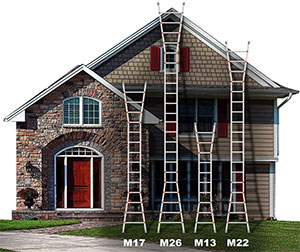 The first step in using the ladder right is choosing the right ladder for the job. The first step in using a ladder is inspecting whether it is in the right position and operating correctly. But in most cases, some people do not even know what to inspect.
The first step in using the ladder right is choosing the right ladder for the job. The first step in using a ladder is inspecting whether it is in the right position and operating correctly. But in most cases, some people do not even know what to inspect.
Ladders are not all equal, and you cannot have a one-size fit for all tasks. If you have a 14-foot ladder, it will come in handy, allowing you to reach high ceilings, but it will need you to have more room than the ladder, which is 8 feet tall.
Another step in ensuring you have the right ladder is to consider the policies of ladder usage and set standards. Simple rules like not using an aluminum ladder bear electricity wires should be followed to the letter.
Type I stands for industrial ladders. These ladders should be between 3 and 20 feet high and should hold up to 250 pounds. Type IA ladders should be up to 20 feet high and hold up to 300 pounds. Type IAA should also be up to 20 feet high and accommodate up to 375 pounds. All these are industrial stepladders and can be used in construction jobsites.
Type II ladders are rated commercial stepladders. They should be up to 12 feet high and carry up to 225 pounds.
Lastly, type III ladders are household stepladders, accommodating up to 200 pounds and being up to 6 feet high. To avoid falls and slips, you need to learn how to read these duty ratings.
Type I ladders are the strongest and should be used in industries, while type III is weak and should be used at home.
Even when your ladder does not have a label, you should note that you should not stand on the tippy top end of the ladder since there are high chances of you falling or unbalancing the ladder. If you want to access high places and you have a short ladder, use an extension ladder. If you must use an extension ladder, the ladder should extend at least three feet above the level you are climbing, and it should be secured to ensure that it does not skid when you are climbing up the steps.
- The position of the ladder needs to be right to ensure stability. Besides people climbing too high, some lean stepladders against a wall and step on them just like they would do on an extension ladder. While this brings the working surface close, it is not the right way to use step ladders.
- To use a step ladder, ensure it is fully open and has been locked into place. Manufacturers of these ladders measure their weight rating when they are open and being used the right way. Outside the purpose of the ladder, you increase your risks of falling.
- The ladder needs to be placed on a firm and flat surface. If your stepladder does not look straight unless you tilt your eyes, then you have set it up improperly. You can move your ladder to level ground or level the ground that the ladder stands on. Do not place the ladder on debris. Clear the debris and other items on the ground before placing the ladder.
You might meet all restrictions such as body weight and height but still pose wrongly on the ladder and end up falling. There are simple directions to follow to ensure you have the right position. Whenever you are ascending or descending from a ladder, at least one of your hands should be holding the ladder. This makes it safe for you. If you need to carry something that needs your two hands, find a way to move it.
Your center of gravity should be between the ladder’s side rails. If you overextend to any side of the ladder, you might make it shift and fall. You can always feel when you are not balanced on top of the ladder.
While ladders are common, ladder accidents are also so common. This is why you need to take all precautions you can when using a ladder. Ensure you maintain the ladder often to ensure that small bends do not cause tragedies.
Types of Step Ladders
You can choose step ladders based on their duty ratings, and you can also choose them based on the various types. Note that the more you use a ladder, the stronger and more durable it should be.
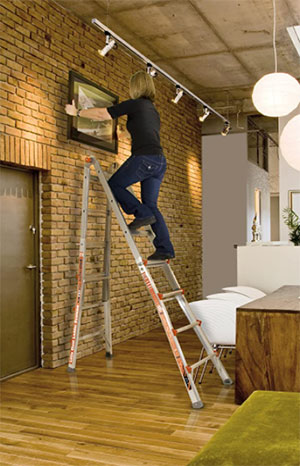
DIY Step ladders have steps about 12 cm deep. They are firmer than household ladders, and they can withstand more horizontal stress, for instance, if you are drilling a wall. These step ladders will always have a tool tray, letting you carry all the tools and parts you need with you up.
Professional step ladders – This is a small upgrade from DIY models. They are very strong and have more features for safety and comfort. If you use ladders frequently and intensively, this is a great choice for you. They possess great stability.
Rolling Platforms – These are large ladders that have a spacious platform at the top. They have mounted wheels for easy transport. These ladders are great when you are painting or cleaning walls in high places. Rolling platforms can be compared to small scale scaffolding. These platforms are highly stable, but they do not fold like other step ladders, and this makes them less convenient to move. You will need to dismantle them for storage and assemble them during use.
Frequently Asked Questions
1. What are the best materials for step ladders?
2. Do step ladders require large space for storage?
3. What is the maximum weight step ladders can hold?
4. Is it safe to climb a step ladder alone?
Conclusion
Step ladders are easy to use, but they can cause accidents when not used correctly. The key is to choose a good step ladder that meets all the set standards and is stable enough to last through different applications. The purpose of the ladder should come first before you consider other factors. However, safety measures are also essential, especially when considering a model for an elderly person.
At home, you can use these ladders when you are accessing the bulb or any other fixture on the ceiling or the wall, accessing an attic with no attic ladders, doing simple DIY home improvement projects, or painting. You can use them when you are drilling walls, fixing the roof, and in many other projects that require you to be on an elevated ground. So, please do perform the choice wiser to ensure that your senior family members will also be able to perform at least the simplest works with ease and comfort.
Some ladders cost as less as $30, but others can cost as much as $150 – choose within your budget and consider your needs.



